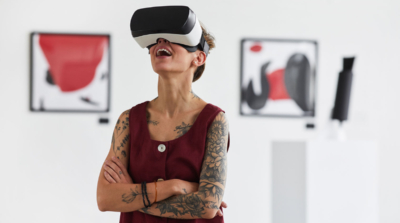Recent research funded by Greater Birmingham and Solihull Local Enterprise Partnership (GBSLEP) and conducted by Limina Immersive has provided useful insights into how organisations can create digital art experiences across the Greater Birmingham and Solihull area.
At the start of the pandemic, GBSLEP established the Step Forward programme, a package of measures to support businesses impacted by Covid-19.
As part of this package GBSLEP funded Limina Immersive’s ‘Digital Welcome’ offering to help arts organisations.
This new report ‘Digital Arts Formats: A guide to creative formats for digital-only arts experiences’ has been produced as a practical toolkit for other organisations to refer to.
Anita Bhalla, Interim Chair of Greater Birmingham and Solihull Local Enterprise Partnership said:
“When we launched our Step Forward programme, we wanted to not only support our businesses during an exceptionally challenging time but provide ideas on how they could adapt to thrive in the future.
“This new toolkit will help artists and organisations within our creative industries to consider different ways of digitally delivering to their audiences.
“It’s critical that this sector can flourish and, this insight and research will help ensure our region’s cultural output is not hampered by the post-Covid world we live in now.”
The Covid-19 pandemic has also meant that creative organisations have had to pivot the ways they deliver experiences to audiences, and one of the ways they have done this is by using technology.
This new research has provided insight into digital art that has proven most popular with the public.
This in turn will influence future work and allow other arts organisations to deliver successful digital art pieces.
Digital artwork from across the last decade was analysed. The top 50 projects to have had an impact on audiences have informed the recommendations in this report.
The research suggests offering digital tools to organisations unlocks a huge amount of artistic potential that then benefits the audience and the impact it has on them.
This includes improved audience well-being and the option to explore the art in their own time and at their own pace.
A recent evaluation of the Digital Welcome programme showed that the free tailored support arts, culture and craft organisations and freelancers were offered for their digital projects had an overall positive impact on their businesses with most feeling that their increased digital skills will have a direct impact on their organisational survival.
Ross Jukes owner of Ross Jukes Photography said:
“The Digital Welcome programme that was delivered by GBSLEP and Limina Immersive allowed businesses like mine to pivot our online offering at the height of the Covid-19 pandemic.
“As the region continues to recover from the pandemic, toolkits such as this one can support arts organisations and ensure their longevity in this new digital art space.”
The benefits of digital art projects include scalability and sustainability.
By making technology more accessible to arts organisations more people can be reached with the potential of growing a wider audience.
To read the full report please visit the GBSLEP website.
For the latest from our region, subscribe to Midlands Matters, the official newsletter of the Midlands Engine.




